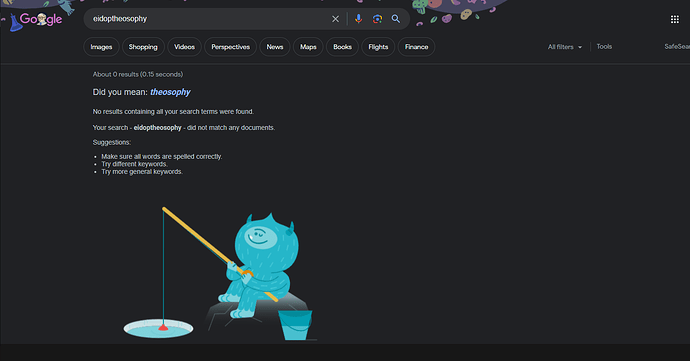it is funny. and it feels like you had more to say…
@jared123456 Maybe go to the wiki and read about eidotheosophy. The wiki covers those issues.
I don’t do the googles. I will check it out.
@jared123456 You mis-spelled it.
lol, I’m silly. I thought I copied your text, let me check
I will say that URL you post is a bit suspect. A that page is brand new so SEO hasn’t had a chance to grab it outside of Google. The second is the domain that was associated with it last is a phishing (strange generic WordPress maybe not malicious) domain.
https://web.archive.org/web/20240121133138/http://www.sre.pfg.mybluehost.me/
@enduser Are you playing dumb? Do you honestly think that once someone conceives of a new idea, it will immediately perpetuate through the internet?
I am a new idea.
Does the book lay it out in detail maybe I would buy it? I think this is really geared for others not myself.
This thread is approaching a tad too much heat for me…
But I did find an interesting quote from the wiki I wanted to bring up:
"
The crux of eidotheosophy lies in the ability to express one’s beliefs with intellectual integrity. By grounding theological convictions in the principles of logic and reasoned discourse, believers can engage in meaningful conversations with skeptics, fostering an environment where the wisdom of God becomes accessible to those who approach with an open mind. This dialogue, enriched by objective reasoning, becomes a bridge between the spiritual and the rational, allowing for a deeper understanding of the divine within the framework of human comprehension.
"
It is interesting to me in that, the underlying personal experience of approaching one’s spirituality with such integrity and reasoning, is so far as I can tell, basically not at all relevant to the experiential underpinnings of the “spirituality” which informs/causes the cultishness stuff we’ve been talking about. As you say:
So, to clarify what I’m saying, it sounds to me like you’re using logic to reason with the unreasonable as to why they should be reasonable… or maybe to you this is about how they can be reasonable, rather than an argument for why they should. Could you clarify this part for me?
@jared123456 Eidotheosophy, instead of using logic to reason with the unreasonable as to why they should be reasonable, gives the believer a reasonable, logical, facts-based foundation for their belief. Using logic to reason with the unreasonable is untenable.
The same should be said about creativity and the closed minded. I think this is the frame you guys are looking for.
Okay, yeah, so it is kind of like this part:
So, for discussion, lets just say I’m a fundamentalist christian, and bible is literal to me (I’m psychologically allergic to reason). Now you present me with this new foundation of reason. Why would I replace my fundamentalism (which enables my other mental shortcuts and saves me the work of logic (which is why I’m a fundamentalist)),…, why would I replace my fundamentalist foundation with your reasonable foundation, when it as a method of spiritual enlightenment is fairly immediately threatening the value/purpose of my current method of spirituality?
A) Does my question make sense?
To me, my question feels like, basically reaching back to my point about the environment enabling the value for one’s such experience of fundamentalism, and the need for our strategy on this issue to address the environment which so enables that way of “spirituality”.
B) Does that perspective make sense?
C) What am I missing?
@jared123456 This topic is getting long, and is not about eidotheosophy, so I have started another topic at Discussing Eidotheosophy (Continued From Another Topic) to continue the discussion and answer your question. Give me a moment, I will proceed to answer your question there.
Maybe? Does this seem like what you mean?:
Yeah those are analogs.
In theory sure in practice it is a slow process for the uninitiated.
It is a bit of practice like meditation, or sleeping. You can become adept at these things in other words you can only catch what your are fishing for (when testing don’t just scrutinize the data / observations you expect). This is true of all things and at the nexus of why science is flawed in many ways right now.
The emphasis is publishability and reputation and less about facts and testing high quality hypotheses.
Your initial post frames need to be a bit more open minded. As a man of science you must not be so dogmatic to the idea that because they believe in a god they cannot further science / rational debate.
I think this is a bit heretical from a scientific stand point, but religion has contributed to science. You must be aware of this.
@enduser I have move the discussion of eidotheosophy to its own post at Discussing Eidotheosophy (Continued From Another Topic) , because continuing that discussion here is continuing to go off-topic.
Not sure this thread is as off topic as is suggested. I’ve enjoyed the exchanges. I tend to agree most with Jared 123456. I will move to read and learn more about on topic posts about eidotheosophy at its new location. This must be a relatively new word. I googled and was fed a lot of stuff about theosophy and one reference to, I believe, Greek gods. My simple-minded question is what does “eido” signify? I’ve not seen a definition of that.
@ironduke I have literally created the concept of eidotheosophy, and have had to create a word for it, because it did not exist before the creation of its concept. Before its conception, nobody has ever seriously tried to resolve Christian faith with scientific principles, only relying on reason, logic, and facts to support such. Eidos in a sense means “seeing”, theos means “good”, and the affix “sophy” means wisdom. Essentially, eidotheosophy means “seeing god’s wisdom”.
